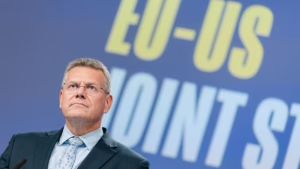Britain is accused of lagging behind in monitoring Russia’s underwater activities following the discovery of surveillance devices targeting Royal Navy submarines in UK waters. Former defense and Foreign Office minister Tobias Ellwood urges for a significant increase in the Navy’s surveillance capabilities after several Kremlin spying devices were confiscated by the military. Ellwood states that this development indicates Britain is now engaged in a “greyzone” war with Russia, involving covert surveillance and potential sabotage of key infrastructure.
The sensors, which were reportedly captured by the Royal Navy with others washing up on shores, are part of Vladimir Putin’s strategy to expand “greyzone” warfare. Ellwood, who recently stepped down as a Conservative MP, considers this evidence of Britain’s involvement in a “greyzone” conflict with Russia, claiming that the Kremlin has deployed underwater platforms off the UK coast to serve as charging stations for miniature submarines. These submarines are allegedly mapping undersea cable networks for potential attacks.
Ellwood highlights the vulnerability of the UK, noting that 90% of data and 60% of gas imported from Norway rely on undersea cables, posing significant risks in the event of sabotage. While welcoming the acquisition of RFA Proteus, a deep-sea surveillance vessel by the Royal Navy in 2023, Ellwood argues that the UK is still lagging in its deterrence and response capabilities, potentially requiring multiple such vessels to address the threat adequately.
Incidents in the Baltic Sea, such as the disruption to the Estonia-Finland power cable and sabotage of telecommunications cables in Swedish waters, have raised concerns about Russia’s alleged shadow fleet and sabotage activities. Ellwood describes the situation as a heated game of cat and mouse that has persisted since the end of the Cold War.
A spokesperson from the Ministry of Defence dismisses the reports as speculation but acknowledges the government’s commitment to enhancing the security of critical offshore infrastructure. There is an increase in defense spending, with an additional £5 billion allocated for the defense budget this year and plans to increase spending to 2.5% of GDP by April 2027.
Armed forces minister Luke Pollard acknowledged a more proactive stance towards Russian aggression but emphasized that responses may not always be reciprocal. The government remains steadfast in maintaining national security and its ability to counteract threats to UK infrastructure.
Source: https://www.theguardian.com/politics/2025/apr/06/call-for-expansion-of-royal-navy-surveillance-after-kremlin-spy-devices-found








